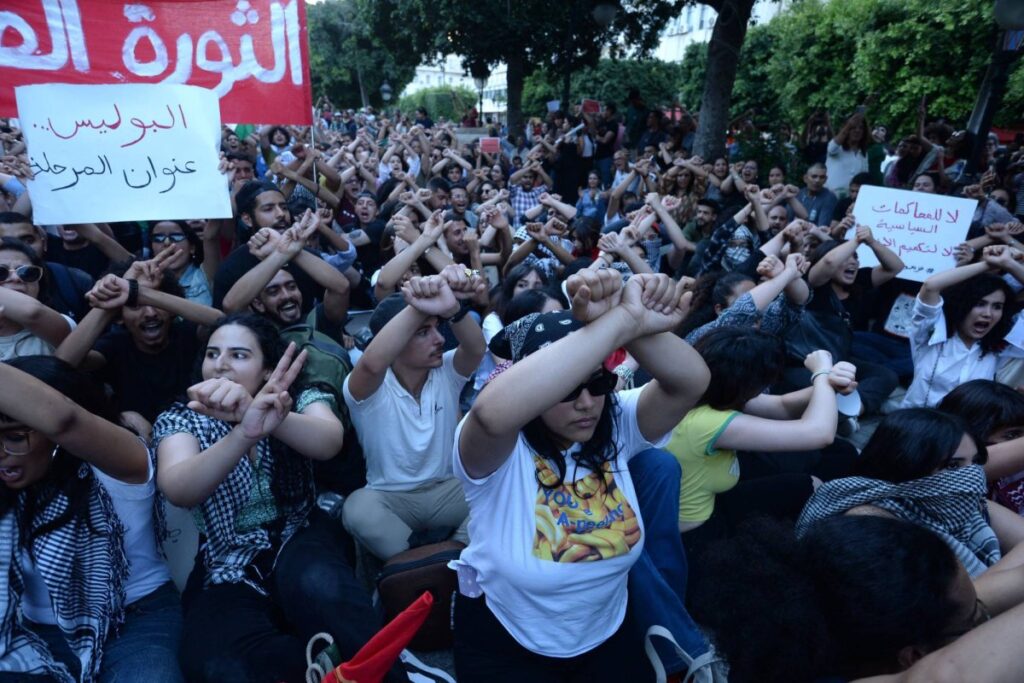Clashes break out between police and protesters in Tel Aviv over return of hostages held in Gaza
Clashes broke out between Israeli police and protesters in Tel Aviv on Saturday after thousands of demonstrators gathered to protest against the Israeli government and demand the return of hostages being held by Hamas in Gaza.
Meanwhile, a small US warship and what appeared to be an anchorage washed up on a shore near the southern Israeli city of Ashdod, not far from a US-built pier that the Israeli military says is being used to transport humanitarian supplies to the Palestinian territories.
Also on Saturday, Israeli bombardment of northern and central Gaza was reported.
Some demonstrators in Tel Aviv held up photos of a female soldier who appeared in a video released earlier this week, moments after she was abducted in a Hamas attack on Israel on Oct. 7, the start of Israel's war with Hamas. Some held banners reading “Stop the war” and “Help us.” They called on the government to reach a deal to release the dozens of hostages still being held, The Associated Press reported.
Protesters also called for the resignation of Israeli Prime Minister Benjamin Netanyahu and demanded new elections.
“We all saw the video. We couldn't stay in our homes after the government abandoned these people,” said Hirit Sagi of the group Women's Protest for the Return of All Hostages.
The attacks have deepened rifts among Israelis over Prime Minister Netanyahu's handling of the war with Hamas.
“Basically they're not doing enough, either military force, hostage deals or negotiations, to get the hostages back. Nothing is being done,” said Sunil Dahan, uncle of hostage Carmel Gat, who remains held in Gaza.
The Israeli army said Friday that the bodies of three hostages killed earlier this week have been recovered from Gaza. The army said they were killed on the day of the attack and that their bodies had been transported to Gaza. The announcement came less than a week after the army said it had found the bodies of three other Israeli hostages killed on October 7.
About half of the 250 hostages held by Hamas and other militant groups have been released, mostly in swaps for Palestinian prisoners held by Israel during a week-long ceasefire in November.
Netanyahu's government is under increasing domestic and international pressure to end the fighting and allow humanitarian aid to the region, which is home to 2.3 million Palestinians, about 80% of whom are displaced.
Also this week, three European countries announced they would recognize a Palestinian state, and the International Criminal Court's chief prosecutor sought arrest warrants for Israeli leaders and senior Hamas officials.
The International Court of Justice on Friday ordered Israel to halt its military offensive in the southern Gaza city of Rafah and open a nearby border crossing for vital humanitarian aid. The UN's top court also said Israel must give war crimes investigators access to Gaza.
But the judges stopped short of ordering a full ceasefire across Palestine, and Israel is unlikely to comply with the court's ruling. South Africa has accused Israel of committing genocide against Palestinians during the war in Gaza, a charge Israel strongly denies.
“We wanted the war to end,” said Islam Abu Kamal, who moved to Rafah from Gaza City after Israel launched a ground operation following a Hamas attack in October.
More than one million Palestinians have fled the city of Rafah in the past two weeks as Israeli forces push deeper into the area. The United Nations and relief groups say Israel's seizure of the Rafah border crossing this month, a key hub for delivering fuel and supplies to the Gaza Strip, has brought the aid effort to the brink of collapse.
Israel has said it needs to invade Rafah to destroy Hamas' last stronghold. Egypt said it had agreed to send UN humanitarian trucks through the Kerem Shalom border crossing, Israel's main entry point into southern Gaza. But it was unclear whether the trucks would be able to enter because fighting is still ongoing in Rafah.
Israel said aid was being transported through northern Gaza and into the Palestinian territories via a wharf built by the U.S. On Saturday, a small U.S. military vessel and what appeared to be a dock washed up on shore near the southern Israeli city of Ashdod.
US Central Command said four of its vessels supporting humanitarian aid efforts were affected by the rough seas, two of which were anchored near a pier off the Gaza coast and two others were anchored in Israel.
U.S. officials said there were no reports of injuries and that the United States was working with Israeli forces to recover the vessel, Central Command said in a statement.
U.S. officials expect that when the dock reaches full capacity, it will be able to deliver 150 truckloads of aid to Gaza each day — just a fraction of the 600 truckloads of food, emergency nutritional medicines and other supplies that USAID says are needed daily to pull Gazans back from the brink of starvation and address the humanitarian crisis caused by Israel's seven-month-old war with Hamas.
Israeli artillery bombardment continued inside the exclave on Saturday, with reports of attacks in northern and central Gaza. Witnesses said people were killed in attacks on the cities of Jabaliya and Nuseirat.
According to the Health Ministry, more than 35,000 Palestinians have been killed in the war, which does not distinguish between combatants and civilians.



